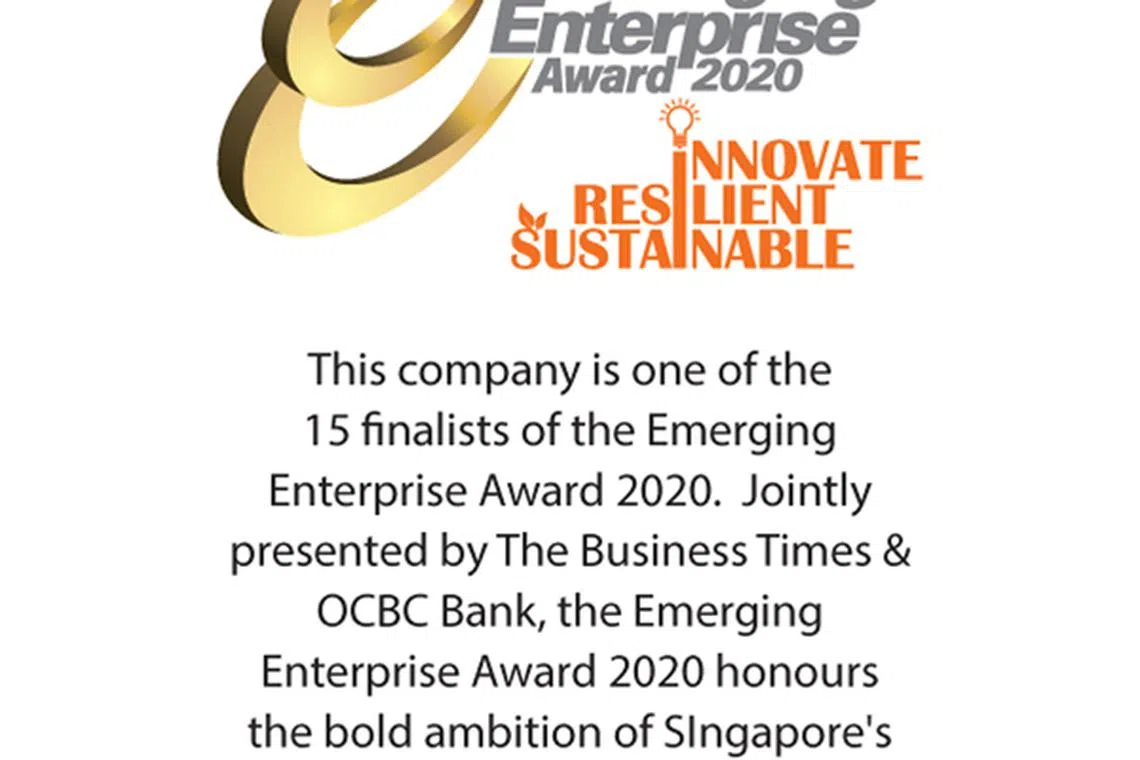Ex-classmates team up to build company powered by smart technology
The seeds of SkyLab, a data courier, were planted over a dinner. There's been no looking back, and it's ready for the global recovery.
SOME entrepreneurs take months, or even years, to come up with a viable business proposition. For SkyLab co-founder and group chief executive Gary Kwang, all it took was a meeting over dinner.
The year was 2015 and he was attending an alumni dinner hosted by OCBC for past finalists of the Emerging Enterprise Awards.
Previously the founder and managing director of 2013 finalist Infracomms, the serial entrepreneur soon found himself chatting with the management team of 2014 winners Sunseap Group, who had a unique proposition for him.
Mr Kwang told The Business Times: "We were posed with a very interesting question by Sunseap, (which) had very stringent data logistic needs."
Sunseap, which was at the time installing solar panels on the rooftops of HDB flats in Singapore, needed a way to deliver the data its solar panels were generating to a central source for further analysis.
"They had to send out data from the systems' performance, the amount of energy generation, and they needed to get the data from the edge to the back-end cloud, where they can do further processing and visualisation."
Navigate Asia in
a new global order
Get the insights delivered to your inbox.
Finding a solution to that problem sparked the incorporation of SkyLab. Within a year, Mr Kwang and his team of co-founders had built the solution.
Billing itself as a data courier, SkyLab used a combination of hardware and software - otherwise known as the Internet of Things (IoT) - to package the disparate sources of data from Sunseap's individual solar panels to a central repository quickly and securely.
Along the way, Mr Kwang roped in Stephen Ho, a classmate from the University of Chicago's Booth School of Business, who joined the firm as its group chief operating officer in 2018.
Said Mr Ho: "We'd kept in touch ever since we left business school in 2009 and (SkyLab) made perfect sense to me, because 20 years back, I was already looking into smart homes, smart cities and so on."
Smart technology, which refers to devices connected via a network, is where SkyLab has the edge, said Mr Ho, because the firm's IoT solution can be adapted for different situations.
For instance, the firm was awarded a grant in 2018 by the Maritime and Port Authority of Singapore to use its technology to enhance high-speed satellite and cellular communication links for ships out at sea.
Most crucially, however, is the advent of 5G technology, which is expected to be fully rolled out in Singapore and up to two-thirds of the world's population by 2025, said a report by Ericsson in June.
The promise of 5G to provide speeds and latency far beyond what is possible with current mobile technology also means that telcos around the world require far more sophisticated systems and software in place, said Mr Kwang, whose background is in telecommunications.
"The concept is the same: How do you move data (at a low latency), as well as very advanced applications within various networks, which is the anchor principle of why 5G is 5G, and not 4G; we have actually developed products and platforms to do that."
He declined to share specific figures, but noted that SkyLab was on track to double its revenue year-on-year in 2020, as it has done in previous years - at least until the Covid-19 pandemic struck.
The global economic situation has meant that some of its overseas projects, including those with 5G applications, have been postponed.
Yet, the team remains unfazed, noting that once the global situation has stabilised, the firm's revenue acceleration would regain steam. After all, the pandemic was hardly SkyLab's first significant challenge along the way.
Initially, the firm faced some scepticism from industry players as its technology was unproven.
There was also pressure to sustain its operations by expanding overseas due to the small size of Singapore's market.
And as if that were not enough, the firm was in a highly competitive industry, where there were few barriers to entry, given the digital nature of the business.
However, it had one ace up its sleeve - the decades of domain expertise its management team collectively possessed.
Said Mr Ho: "In essence, having the domain understanding that we do puts us in a unique situation to address our clients' pain points."
"In essence, having the domain understanding that we do puts us in a unique situation to address our clients' pain points."

Decoding Asia newsletter: your guide to navigating Asia in a new global order. Sign up here to get Decoding Asia newsletter. Delivered to your inbox. Free.
Copyright SPH Media. All rights reserved.
